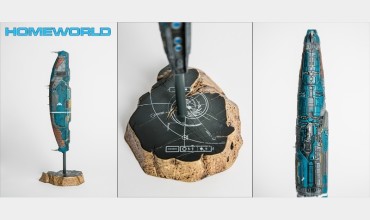Reunion
This is a short work of fiction set in the Homeworld/Fists of Heaven Universe. If you’re not familiar with the FoH backstory lore, you’ll first want to read that here
I’m part a four-man breaching-and-boarding team (‘man’ referring to person, rather than gender), and as a ‘hull buster’ my job is to take over Taiidan ships – the hard way. Officially, I’m a security specialist in the 2nd Special Tactics & Operation squadron of the Kushanii Naval Special Forces, more famously known as the Fists of Heaven. We specialize in completing high risk, high reward missions, and this one is no exception. I and my team volunteered to escort what will be this ship’s new captain and navigator to the bridge of an enemy vessel during a live breach/combat situation. Standard procedure is clear a ship first, and once secured, bring aboard bridge personnel. But if this was by the book, the Fists of Heaven wouldn’t be here. According to intel, we have only a narrow time window in which to capture this Destroyer before enemy reinforcements exit hyperspace, and the target is protecting key assets required for our next operation (the details being above my pay grade, as per usual).
Right now, my job is to reunite with my team, and the Taiidani security specialist is my current obstacle to completing that objective. He’s taller and heavier than most in this line of work. That’s unusual, but it’s also an advantage, in my favor.
When people think ‘close quarters combat specialist’ and ‘special forces soldier’ they typically think of massive soldiers with bulky musculature – but that’s not the case, now or historically. Speed and agility count for a lot more than mass with a firearm or edged weapon. The confined space onboard a ship also compounds the disadvantages of larger stature: in addition to making you an easier target, broad shoulders and increased height just means you’re running into bulkheads a whole lot more often, especially in PPE.
Watching the security specialist from my prone position while attempting to ascertain my physical status and capabilities, I momentarily envy his lack of SCBA (Self-Contained Breathing Apparatus) and full pressure suit armor.
PPE (Personal Protective Equipment) is a bitch. You just love to hate it. PPE failure is probably why I was rendered unconscious and separated from my team, but it’s also probably partly the reason I’m still breathing. Helmets, face shields, gas masks, body armor, gloves: they keep you alive, but they come at a cost. A high cost, measured in visibility, speed, agility, and dexterity…or lack thereof. The predictive face shield failure in my helmet is apparently why a flashbang grenade knocked me out, but said helmet, along with my heat-resistant body armor, is what prevented my optic nerve from suffering permanent damage and the skin from melting off of my chest. Close quarters combat PPE is about balancing practicality with survivability: too much can place you at a disadvantage, especially in the close confines of a ship. Too little PPE and you tend to get injured and/or die more easily – and for every man injured, that’s at least two, if not three of our guys out of the fight under ‘normal’ circumstances. These aren’t normal circumstances and we’re not part of a normal squadron, so now I’m on my own.
PPE is a bitch. You just love to hate it.
Good close quarters combat training teaches you to ensure, rather than assume that the enemy is eliminated. The enemy specialist has apparently failed to asses my vitals while I was unconscious so I’m now alive and conscious again, but lacking a functional helmet and communication equipment. Tactically, close quarters combat hasn’t changed much through the ages. I’m doing the same job that countless other soldiers and security personnel have done before me, regardless of surroundings. Whether it’s caves or corridors, the three golden rules of CQB always prevail: speed, surprise, and violence of action. However, these skills decay rapidly if not consistently trained, and that’s something that the Taiidan evidently don’t consider a priority for ship shipboard security personnel.
I carefully and quietly roll to the side and into a crouch, bring my SMG up and front-sighting my opposition. Projectile weapons onboard a vessel are obviously a liability: you’re just as likely to kill yourself or a teammate with a ricochet as you are to take out the bad guy. That’s why we, like most shipboard security teams, carry compact, compressed-gas powered SMG’s (they’re quieter than traditional firearms, and will fire in a vacuum) with frangible ceramic rounds. When they hit a person, they rip out a section about the size of both my fists. When they hit the bulkhead, they explode into a fine powder. No ricochet, no decrease in stopping power, no problem (theoretically). However, ceramic rounds are also much more easily defended against by body armor, which means the chance for me to obtain a clean kill with my SMG is unlikely. Being separated from my team, I’m not in the position to fight off reinforcements or to potentially forsake the element of surprise, so I do not fire.
The Taiidani suddenly looks more attentive and moves cautiously down the hallway to my left, apparently in response to communications received. This places his focus further from my position.
Seizing the opportunity, I quietly set down my SMG and feel for one of the knives that I have tucked inside the molle of my body armor below my sternum. A favorite among us security specialists, this particular dagger has a metal ring where the pommel would traditionally be, meaning that I can access it from either hand and that it will stay in my hand when transitioning from knife to sidearm. It’s also not easily seen by the enemy, and thus not easily used against me. I carry a second one behind my neck, along with a tanto blade over my heart and a karambit with armor-ripping teeth on my hip and on the inside of my left thigh. In close quarters combat on the ground, edged weapons are typically used to create space in order for the soldier to move up the compendium of force, transferring from knife to sidearm to rifle. In the confines of a ship, just as often as not the fight starts and finishes with an edged weapon. Given the lower lethality of ceramic rounds combined with the fact that there’s often no space to be gained means that fights onboard a spacefaring vessel are very up close and personal: the reality is that the soldier with the superior edged weapon skills is often the soldier that walks away alive.
I quietly roll into a crouching position and peek around corner, simultaneously drawing my knife, gauging the number of steps required to close the distance to my opposition: four.
The traditional infantry soldier since the invention of projectile weapons has avoided, if not abhorred, edged weapon combat as a rule. From a psychological perspective it is much easier to train a soldier to kill with a projectile weapon than with a melee weapon. One must either have extensive training with emphasis on edged weapons or possess a true zeal for killing before one can master the art of edged weapon combat. The thought of stabbing another living being with cold steel is often so repulsive that I’ve read several historical cases of soldiers reloading as fast as possible in order to kill the other with their rifles rather than resort to bayonets. In some ways, we’ve been lucky: the Taiidan have enjoyed space superiority for so long that their security specialists don’t often carry more than a single blade.
As far as I know, no one has forcibly boarded a Taiidani vessel in over a thousand years, until very recently when we were driven from Kharak. Their subpar close quarters combat training and relative lack of PPE is something I’ve been thankful for on more than one occasion, and this time is no exception.
I silently take two slow steps, then lean forward and quicken my pace, my right thumb pressed against the top ring of my knife, blade held downwards. As I close the distance, I lean forward and bring my hand up, blade still pointed down. I then then palm strike the back of his helmet to push his head forwards and away me, creating the space I need between helmet and body armor and use my bodyweight to drive the blade between my enemy’s cervical vertebrae. His body slumps forward as I quietly lower it with a bearhug – a clean kill. I’m momentarily flooded with a surge of righteous vengeance: I love to kill Taiidani. Pausing momentarily to extract my blade, I silently wish my job allowed killing much more slowly as I begin scanning my surroundings for a path to the bridge. Retrieving my SMG, I continue the job to secure command and reunite with my team.
This is my first completed short story, and Julian and I put a lot of time into and had a lot of fun with this project. If you enjoyed it and would like more illustrated short stories, please let us know in the comments! -Mike

Like FoH?
Fists of Heaven is ad-free and always will be. If you enjoyed the content above, help us out by sharing this post, or by commenting and letting us know what content you like and want to see more of. Thanks for reading!




